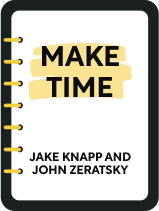

This article is an excerpt from the Shortform book guide to "Make Time" by Jake Knapp and John Zeratsky. Shortform has the world's best summaries and analyses of books you should be reading.
Like this article? Sign up for a free trial here .
Is your technology distracting you at work? How can you be mindful of technology?
If you need to get work done, technology will only distract you. In his book Make Time, Jake Knapp and John Zeratsky suggest dozens of strategies to limit the ways that devices can distract you from your work.
Read below for a few techniques that can help you be mindful of your technology usage.
Use Technology Purposefully
The key to taking your life back from technology is to be mindful. Technology of any sort can be distracting, whether it be your phone, WiFi, or television. Knapp and Zeratsky advise that you determine which single app or device drains the most of your time and find a way to change how you use it.
While you may not want to abandon social media completely, you should try to be mindful of why and how you use each different platform. Ask yourself what each one’s purpose is for you, and what’s the most efficient way to achieve it. Once you know the answers to those questions, the authors point out that you can better budget your time.
In particular, Knapp and Zeratsky recommend you disconnect from the 24-hour news cycle. Instead, they suggest you set aside time to read the news once per week. Modern news is modeled around sparking fear and anger in consumers to drive your attention toward ads. Any events of major importance will still be in the news when you get around to it, and hopefully with more nuanced analysis than spur-of-the-moment “breaking news” allows. If something major happens in the world that you need to know about, the authors insist that it will reach you through other means than your devices, such as hearing about it from people at work.
In contrast to Newport’s advice to check the news in the morning, Knapp and Zeratsky suggest removing the Internet entirely from your morning routine, arguing that the moment you first log into your email, check the news, or look at social media, your struggle to fight against distraction begins. The longer you can delay that from starting, the longer you’ll feel clear-headed and focused. If you need extra help avoiding the internet, you can even consider putting your home’s router on a vacation timer, so that the Internet is only available for certain hours of the day.
The Headline Tug-Of-War
Studies document that the “shock and outrage” nature of the 24-hour news cycle has negative effects on mental health, while the decisions of various news outlets about what and how to report information have an outsized influence on policy decisions (known as the CNN Effect).
The rapid pace of modern news leaves little time for reflective analysis on the part of readers or journalists, and the sheer volume of headlines forces people to filter information down to what they can process. This can lead people to digest only the news that already supports their worldviews.
Surprisingly, Digital Minimalism proponent Cal Newport doesn’t recommend cutting daily news out of your life, if only because staying informed is part of your civic duty. He does recommend controlling your intake by reading or listening to the news once a day, preferably in the morning. That way, if events are taking place that require your attention, you’ll have the energy to research them using credible sources.
The Distraction Problem Isn’t Yours Alone
In Stolen Focus, journalist Johann Hari is highly critical of the way information technology is designed and implemented, with business models based on disrupting your attention, harvesting your data, and deliberately provoking anger and anxiety to increase user engagement. Hari argues that the cascade of negative effects from this cycle affects us not only on the personal level but is corrosive to society as a whole, which is why we need to be mindful of technology.
The problem is so overwhelming that it needs to be addressed systemically. Hari calls the type of strategies Knapp and Zeratsky to espouse “cruel optimism”—persuading people to try and solve major societal issues with narrow, individual actions. In Hari’s opinion, the problems we face in the Age of Information are too large for small-scale solutions to affect. Hari believes that Big Tech companies should be incentivized to switch to a different business model, one not based on constant distraction.
Not everyone is quite so pessimistic about the pros and cons of information technology. Futurist and author David Brin points to how worldwide information connectivity can engage our natural tendency toward empathy, while much of modern “distracting” entertainment promotes inclusivity and gives voices to otherwise marginalized people.

———End of Preview———
Like what you just read? Read the rest of the world's best book summary and analysis of Jake Knapp and John Zeratsky's "Make Time" at Shortform .
Here's what you'll find in our full Make Time summary :
- How the current landscape is designed to steal your time and attention
- How to be proactive to take back your time
- Why we were all better off as hunter-gatherers






